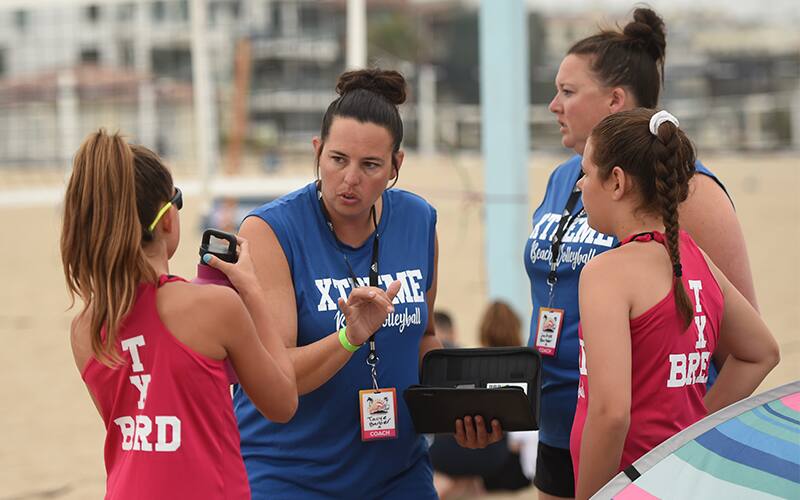
While individual athletes might understand how to persevere and show grit while pursuing their goals, it can be tough for a coach to bring those lessons to a whole team since each player might have different goals, respond to different motivators, and be interested in sport for different reasons. But sports are the perfect chance to teach team-based grit, which can help athletes in sport and in their future careers.
Grit – like perseverance – has been defined as the tendency to “sustain interest in and effort toward very long-term goals.
Research has shown that the sense of belonging that comes from being on a sports team, along with a common goal, helps children understand the importance of ‘respecting the rules and honoring responsibilities.’ Angela Duckworth, the researcher who coined the term ‘grit’ in 2007, has found that focusing on a goal as a team can improve focus in all aspects of life.
But how does a coach bring grit to the entire team?
Develop a Team Mission Statement
At the beginning of the season, gather the team and create a mission statement for the season. What does grit mean for the team? What do the players want to work on from a skills acquisition standpoint? What will success look like? What does it mean to have perseverance during practice or competition? Remember, young athletes take their cues from you, so it’s your responsibility to help them understand that ‘grit’ doesn’t simply mean ‘winning’ or ‘never giving up.'
Help them define the team’s values around grit but let them do the actual phrasing and writing. Giving your athletes ownership of this statement will help unify the team around their common mission.
Make Sure It’s Not All About Game Day
If the only emphasis on your team is ‘winning the game’ or ‘game day strategy,' it can be hard to push through rough patches and seasons that don’t go according to plan. As you’re talking about perseverance and dedication, make sure that language is used during practice, as well as on game day.
Setting a specific goal for each athlete to achieve at practice (a certain number of repetitions of a drill, for instance) and having the athletes work together to ensure that everyone meets that goal can be one way to make sure the players are persevering together all the time, not just on game day.
Don’t Pit Your Athletes Against Each Other
It’s hard to push through tough times as a team when each athlete is more focused on outshining his or her teammates than performing well as a unit. For young athletes, research has shown that comparison to others, rather than an emphasis on personal development, makes sports less enjoyable. Challenge the athletes in practice, but don’t make them feel as though they’re being ‘graded’ against each other.
But Let Them Be Competitive
Yes – even with each other at practice. While you don’t want to create a culture of comparison, you do want to allow teammates to feel competitive. Challenging each other to be better and persevering through the inevitable failure will help them at their next game…and for the rest of their lives.
Deborah Gilboa, a board-certified family physician and respected youth development and resilience expert, says, “Competition can be really great for kids. If you can teach them to treat each other respectfully, they can compete all they like.”
“Competition teaches,” explains Gilboa. “The winner learns how to win without over-celebrating and the loser learns how to lose without too much fuss. Kids monitor each other really well. They give honest, if harsh, criticism of poor behavior. They do not hesitate to call each other on cheating, bragging, whining. You do not need to intervene as they teach other these lessons unless the punishment is genuinely too harsh.”
Change Your View Around Winning
A recent study showcased that both girls and boys want to ‘try their best’ and ‘work hard’ during practice and in competition – and that’s what makes sports fun for them. That’s right: Grit is actually fun! This research dispels the traditional myth that boys are focused on winning while girls are focused on friendship. Incidentally, winning only ranked 40th in importance in this new study.
Bearing that in mind, focus less on creating goals around winning and turn your focus to team-wide, process-oriented goals that the team can strive for together. Since process goals focus on personal development instead of the scoreboard, it’s easier to instill a sense of grit and perseverance in the players, regardless of how the team is comparatively doing, because players can still meet goals and see progress.
Keep in mind that introducing lessons of grit and perseverance during your team’s practice will help your athletes look at challenges and obstacles as opportunities rather than risks.
About TrueSport
TrueSport®, a movement powered by the experience and values of the U.S. Anti-Doping Agency, champions the positive values and life lessons learned through youth sport. TrueSport inspires athletes, coaches, parents, and administrators to change the culture of youth sport through active engagement and thoughtful curriculum based on cornerstone lessons of sportsmanship, character-building, and clean and healthy performance, while also creating leaders across communities through sport.
